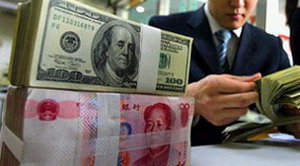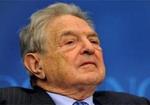|
|

The buzzword "currency war" has been making headlines around the world in recent months since the Brazilian Finance Minister Guido Mantega coined the phrase for the first time in September.
An army of experts and officials declared their thoughts on the issue as more and more economies joined in the intervention over exchange rates. Here we try to map out the cause and developing progress of the episode and work out a possible finale.
|
|
|


The United States pulls the trigger:
In early September, news that the US Federal Reserve was leaving its door open for a second round of quantitative easing started to make headlines, spurring the building of short positions on the market. This second phase of quantitative easing, dubbed QE2, has been widely viewed "an atomic bomb" given that the Fed's purchases of assets such as bonds will inject further huge liquidity into the US economy>>>>>
Japan: Japan took to public intervening in the forex market for the first time since 2004 as the Japanese yen also hit its highest in 15 years against the US dollar on New York market.
Brazil: Brazil government put in place a flurry of measures to limit the gains in its exchange rate.
Thailand: The Thai cabinet imposed a 15 percent withholding tax on capital gains and interest payments for government and state-owned company bonds.
South Korea: The Asian nation has been intervening intermittently to hold down the won during the course of this year.
Switzerland: The neutral state started unilateral intervention against the Swiss franc in 2009 for the first time since 2002 and did not sterilise it by buying back in the domestic money markets what it had sold across the foreign exchanges.
India: India intervened to temper a rising rupee on Oct 14 as foreign exchange tensions persisted ahead of a key G20 meeting >>>>>
|
|


Renminbi becomes a scapegoat of US mid-term election:
US government blames the high unemployment at home on China’s exchange rate regime. With mid-term elections just round the corner, the Obama administration is under pressure to show the voters that they are tackling the problems in right earnest. China at this time naturally became the scapegoat, and hence we could say that the US has politicized China's currency policies >>>>>
Goal of US targeting at renminbi exchange rate:
The new methods that the US has adopted most recently includes multi-lateralizing this bilateral issue by encouraging other economies to pressure China to sign on a global deal and ease the international criticism on US for its loose currency policy to depreciate US dollar>>>>>
Pragmatic choices for China and US:
Both countries must, in other words, contribute to eliminating global imbalances and undue exchange rate pressures on fast-growing developing nations. If they don’t they will place an even heavier burden on those emerging economies whose potential for growth can help push the world into a new era of sustained prosperity. That would be in the interests of all nations – China and the US included.
As a fast-growing emerging economy whose currency is on the way to internationalization, China should take into consideration long-term and short-term interests in any exchange rate war with the US and should be psychologically poised for a lengthy test>>>>>
|
|


The essence of currency war:
A currency war is in essence a financial war, or a war for more wealth possession, one in which the country that has the dominant say in world's currency issuance will gain an absolutely advantageous position in global wealth distribution. To put it crudely, the US wants to inflate the rest of the world, while the latter is trying to deflate the US. The US must win, since it has infinite ammunition: there is no limit to the dollars the Federal Reserve can create>>>>>
The goal of the exchange rate disputes:
A competitive dollar abroad means that other countries should not implement policies that artificially depress the value of their currencies in order to promote exports and deter imports>>>>>
How to realize global trade balance:
As FT columnist Martin Wolf pointed out that a strong, balanced and sustained world recovery requires two fundamental and difficult economic rebalancing acts. The first is internal rebalancing – a return to reliance on private demand in advanced countries and retrenchment of the fiscal deficits that opened in the crisis. The second is external rebalancing – greater reliance on net exports by the US and some other advanced countries and on domestic demand by some emerging countries, notably China. |
|

Stratedy of China and US:
China's currency would experience a long-term appreciation progress to ease the international pressure and its internal property bubble. US dollar would enter into a downwards track against others currencies as long as its inflation index doesn't reach to an unbearable line.
The overflowing dollar would inflate the rest of the world or force their nominal exchange rates up against the dollar. Unfortunately, the impact will also be higgledy piggledy, with the less protected economies (such as Brazil or South Africa) forced to adjust and others, protected by exchange controls (such as China), able to manage the adjustment better>>>>>
G20 Summit: a showdown arena
And, if the IMF is to assume its new historical role, it should continue to press ahead with more internal reforms and keep promoting a game-changing overhaul of the international financial system to sustain a fair and orderly global recovery>>>>>
|
|

|

George Soros:
China must fix the global currency crisis
"The imbalances in the US are the mirror image of China. China is threatened by inflation, the US by deflation. The US needs fiscal stimulus enhancing competitiveness rather than quantitative easing that puts upward pressure on all currencies other than the renminbi." |

Martin Wolf:
America is going to win the global currency battle
"To put it crudely, the US wants to inflate the rest of the world, while the latter is trying to deflate the US. The US must win, since it has infinite ammunition: there is no limit to the dollars the Federal Reserve can create." |

Wu Qing:
US has been the biggest beneficiary of Chinese exchange rate
"In the short term they may cause transformation of the mode of economic growth and the process of transformation is uncertain. In the toughest year, policymakers are unwilling to add risk. In short, they delay solution to RMB issue." |

Martin Feldstein:
The future of the dollar
"A competitive dollar abroad means that other countries should not implement policies that artificially depress the value of their currencies in order to promote exports and deter imports."
| |
|
 China
World
Newsmaker
Slides
Weekly Photos
Share Your Photos
Special
China
World
Newsmaker
Slides
Weekly Photos
Share Your Photos
Special
